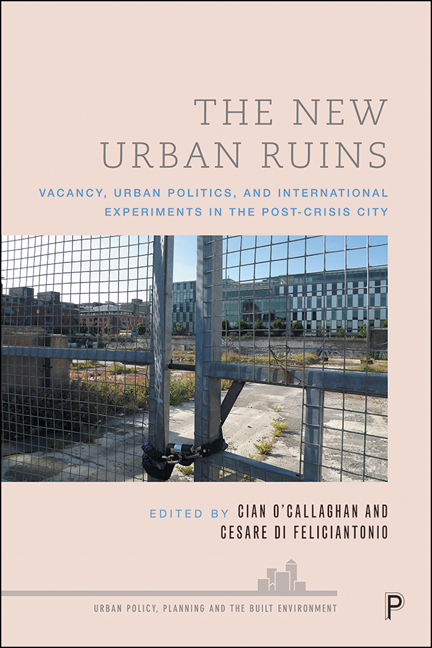Book contents
- Frontmatter
- Contents
- List of figures and tables
- Notes on contributors
- Acknowledgements
- Introduction
- PART I Rethinking ruination in the post-crisis context
- PART II The political economy of urban vacant space
- PART III Reappropriating urban vacant spaces
- Conclusion: Centring vacancy – towards a research agenda
- Index
4 - Building the new urban ruin: the ghost city of Ordos Kangbashi, Inner Mongolia
Published online by Cambridge University Press: 13 May 2022
- Frontmatter
- Contents
- List of figures and tables
- Notes on contributors
- Acknowledgements
- Introduction
- PART I Rethinking ruination in the post-crisis context
- PART II The political economy of urban vacant space
- PART III Reappropriating urban vacant spaces
- Conclusion: Centring vacancy – towards a research agenda
- Index
Summary
Introduction
In March 2020, when Australia began shutting its borders and non-essential services were restricted due to COVID-19, I took to running outdoors when I could no longer go to the gym. Hitting the pavement at dusk, this ritual would mark the end of my workday. I would follow the same route that would take me past the local McDonald’s, where, without fail, there would be a steady stream of cars at the drive-through. I thought this peculiar given the pervasive fear of community transmission, the government mandate for people to stay at home unless absolutely necessary and tightened household spending in light of escalating unemployment rates and a possible recession. In the face of a pandemic that had left no part of society, and no country, untouched, the queue tellingly indicated daily exhaustion, as well as a desperate holding on to some semblance of normality in a world that had completely changed in a matter of weeks. The activity at the fast-food restaurant was a comic juxtaposition to the No. 212 bus that would, as if on cue on my evening runs, trundle by at that point, carrying no more than a handful of passengers. On some nights, there was only the bus driver.
Extraordinary images of cities appeared in news stories and online videos in the weeks following the start of the pandemic, which showed the impact of lockdowns and partial closures: the cleared skies over Delhi due to decreased air pollution; boars from the mountains roaming deserted roads in Barcelona; and the stillness of Siena's dormant streets, interrupted by the fullness of voices singing in unison from apartments above. In a CNN story in early April 2020, reporter Richard Quest walked through Times Square in New York City during an unusual rush hour. There were few pedestrians in the vicinity and minimal traffic flow. In the city that never sleeps, the giant digital screens still provided sensory overload but product placement was now side-by-side with warnings and advice concerning the virus. The post-apocalyptic mood of the story gave way in the end to Quest's uplifting comment: ‘Who knows how long this will last. It's good to see it's all still here. Waiting for us to return’ (Quest, 2020).
- Type
- Chapter
- Information
- The New Urban RuinsVacancy, Urban Politics, and International Experiments in the Post-Crisis City, pp. 73 - 88Publisher: Bristol University PressPrint publication year: 2021



